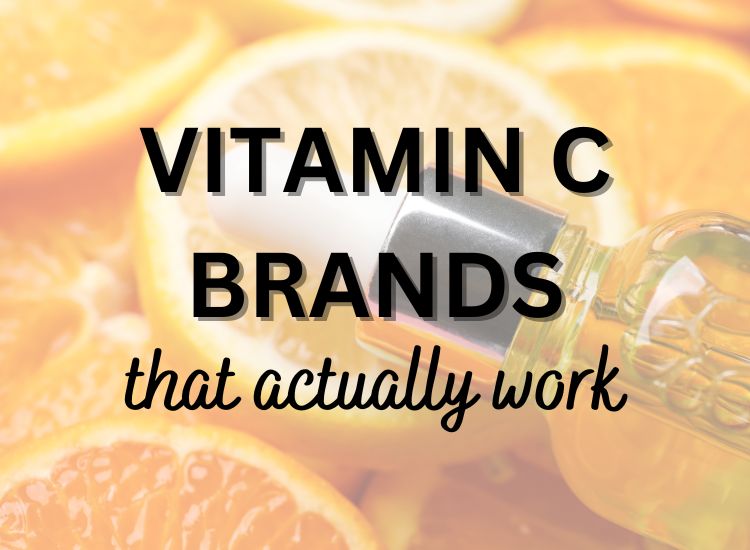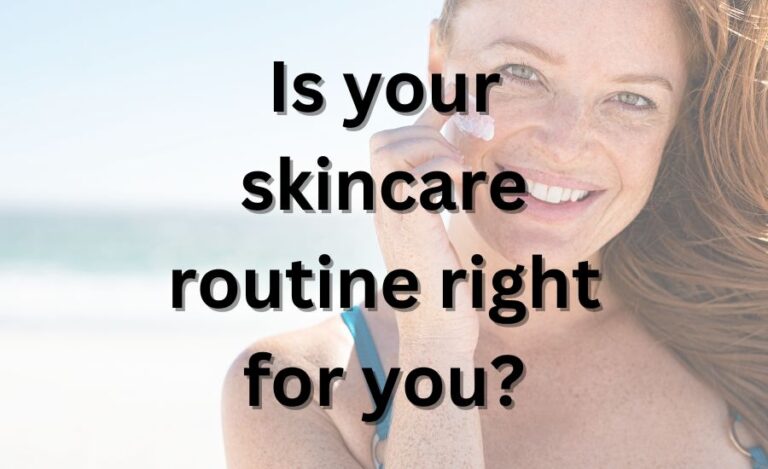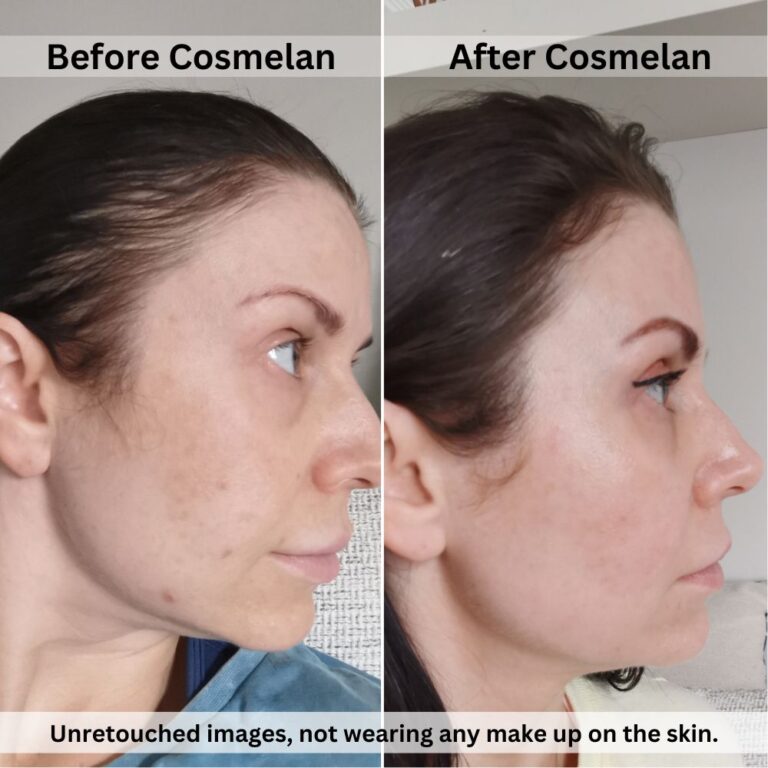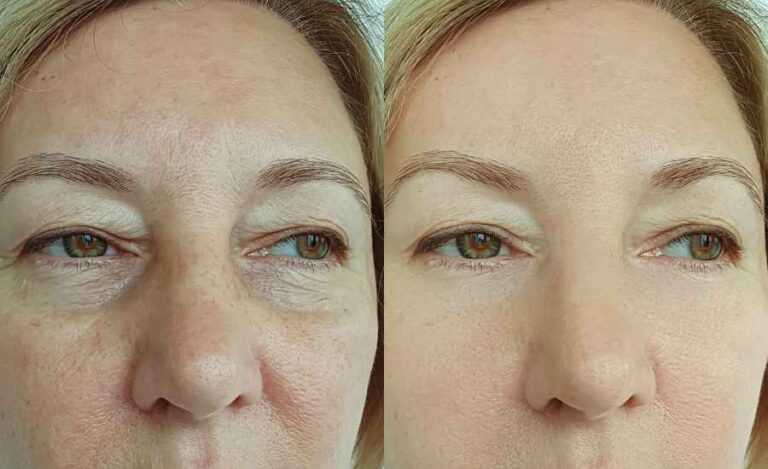Hyaluronic Acid vs Vitamin C, so which one is better for our skin when we start moving towards 40 and the appearance of fine lines starts to creep in? Perhaps other signs of aging like dark spots or uneven skin tone.
The short answer is both.
They do different things to the skin, but fight the same fight if you know what I mean. It’s like having 2 great soldiers instead of just one when it comes to fighting the “signs of aging war”.
Hyaluronic Acid vs Vitamin C Serum, do you need both if you are over 35?
Let’s first understand exactly what each of them does for your skin.
Here are some of the benefits of hyaluronic acid for maturing skin.
1. Intense Hydration: Hyaluronic acid has the ability to hold up to 1,000 times its weight in water. This means it provides deep hydration to all skin types, helping to plump and hydrate dry skin.
2. Smoothing Fine Lines and Wrinkles: By retaining moisture in the skin, hyaluronic acid can help reduce the appearance of fine lines and wrinkles, creating a smoother complexion.
3. Enhanced Elasticity and Firmness: Hyaluronic acid supports collagen production, a crucial protein for maintaining skin elasticity. Skin elasticity is lost with age, due to loss of collagen, so using skincare products that help promote collagen production is very beneficial.
4. Improved Skin Texture: Regular use of hyaluronic acid can lead to softer, smoother skin with a more refined texture, reducing the appearance of roughness and unevenness.
5. Accelerated Wound Healing and Repair: Hyaluronic acid has been shown to aid in wound healing and tissue repair. This can be beneficial for addressing skin damage caused by environmental factors or the aging process.
Benefits of Vitamin C for maturing skin.
1. Brightens Skin Tone: Vitamin C brightens the complexion by inhibiting excess melanin production. This can lead to a more even skin tone and reduced appearance of dark spots or hyperpigmentation.
2. Antioxidant Protection: Vitamin C is a powerful antioxidant that neutralizes free radicals, which can cause premature aging. It helps protect the skin from environmental damage, like UV rays and pollution.
3. Reduces Sun Damage: Vitamin C helps repair sun-damaged skin by neutralizing free radicals generated by UV exposure. It can also assist in fading sunspots and preventing further damage.
4. Enhances Skin Texture: Regular use of vitamin C can lead to smoother, softer skin with improved texture. It can also help with rough or uneven skin.
5. Collagen Production: Vitamin C also stimulates the production of collagen synthesis just like hyaluronic acid.
Now that you know what concerns these fantastic skin care products can address you can make your selection based of that.
Personally, I choose to use both, because often, I, like many of us over 35 have all of the above concerns as it just naturally comes as a part of the aging process. These two types of serums or creams containing those ingredients go hand in hand and can be a part of your simple skincare routine.
You can check out my Morning and Evening Skincare Routine here to see how I layer various serums and creams in a simple and time-effective way with affordable brands.
Hyaluronic Acid vs Vitamin C: What about the sensitive skin?
Vitamin C aka L-ascorbic acid or just ascorbic acid (all the same thing) can sometimes be irritating on the skin if you don’t start with the right concentration. So it is important to choose carefully – here’s the guide on where to start.
Some brands have various concentrations of vitamin C in it. Ranging from 5% all the way up to 25%. You definitely want to start with the lower concentration if you never used Vitamin C before. Work your way up from there if you feel comfortable and no irritation occurs.
Each time you level up, pay attention to any irritation and if any occurs you may need to stick with the lower concentration that you previously used. More is not always better if it causes irritation and redness for longer than 1 week.
Here are a few affordable Vitamin C serums that you can try that have worked for me in the past as well as many of my clients.
Mild: The Ordinary Ascorbic Acid (vitamin C) 8% – around $15 AUD per 30ml (Serum)
Moderate: Plum Vitamin C Serum 15% – around $25 AUD per 30ml (Serum)
Strong: Timeless Vitamin C Plus E 20% – around $54 AUD per 50ml (Serum)
When starting on a new product always do a patch test behind your ear or somewhere not very noticeable in case you get some irritation, redness or flakiness from the product.
Bear in mind some redness is normal from the initial use of Vitamin C until your skin adjusts to it. So if irritation is not too uncomfortable or severe then persist with the product for at least a week or 2 and if after that your skin still doesn’t adjust perhaps the vitamin C concentration is a little too strong for you.
Hyaluronic Acid products on the other hand are a lot less irritating and considered well-tolerated by most people. The only exception is if you have pre-existing skin conditions, allergies, or very sensitive skin.
In union Hyaluronic Acid and Vitamin C both work together to tackle the appearance of wrinkles, regenerate skin cells, improve skin hydration, and promote healthy skin. So using them together makes sense. I have been using both products for the past 7 years and definitely see the difference and improvement in my skin.
However, it’s worth noting that not all brands are created equal and it took some trial and error for me to find products that work well.
If you are a regular reader of my skin care-related articles you will know I love The Ordinary brand for my retinol. I initially started with The Ordinary Vitamin C Serum 8% and worked my way up to Plum’s 15% strength which I am comfortable with.
Anything higher than that is giving me a bit of redness on the cheeks. But I do have slightly sensitive skin as I have annual peels like Cosmelan peel for dark spots, so I need to be a little more gentle with my skin. If you don’t do peels you might be able to go higher on your vitamin C strength.
Here is a Hyaluronic brand that I found worked best and made the most difference to my skin:
La Roche-Pose Hyaluronic Acid Serum – around $49 AUD per 30ml
Here are some Frequently Asked Questions that might help you get started on your skincare routine.
Is Hyaluronic acid enough for anti-aging?
Whilst hyaluronic acid can help with hydration and moisturisation of the skin, you will see much better results if you use it in conjunction with other products like Vitamin C, Retinol, good quality night cream, and of course high-SPF sunscreen moisturiser.
Let me use fitness as a metaphor since I am also a PT. Think strength training, cardio, and flexibility/mobility work together would benefit you more than just one of those by itself. While doing just one of those would already make a difference and make you healthier, incorporating all three types of training will be even more powerful and make you ‘bullet proof’.
Does Vitamin C serum help with wrinkles?
Yes, it helps with wrinkles, dark skin spots and fights the free radical damage of the skin. Vitamin C is instrumental in overall skin health, as it’s a powerhouse ingredient in your skin care routine. It’s also a great antioxidant so it helps the skin become healthier and more glowing. If you suffer from dark spots from aging, sun damage, and melasma Vitamin C is your best friend.
Which is better for mature skin collagen or hyaluronic acid?
Hyaluronic acid as mentioned above helps promote collagen production and Vitamin C does that as well. I found taking actual Collagen powder orally proved to be more effective for my overall skin and hair.






